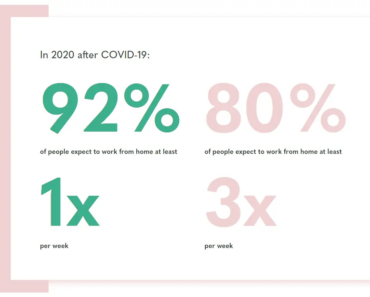
Have you ever found yourself tackling work emails at a bustling coffee shop, a quiet hotel room, or even on a moving train?
Do you crave the flexibility and freedom that remote work can offer, but worry about the challenges that come with it?
Thanks to the widespread availability of high-speed, affordable WiFi and portable smart technology, remote work has become the norm in many industries.
Even before the 2020 global pandemic made working from home a reality for millions, countless employees were already working from homes.
Cutting-edge technologies like Skype, FaceTime, Slack, Zoom, Google Hangouts, authenticator apps, and cloud computing have made it possible for many types of work to be performed just as effectively, if not more so, outside of traditional office spaces.
It’s clear that remote work is no longer just a trend for the future – it’s how many of us are already working every day.
In this blog post, we’ll dive into the key terms, statistics, and opportunities associated with remote work, and provide guidance on how you can effectively perform your job from anywhere.
Get ready to embrace the future of work and discover the potential of remote collaboration!
Table of Contents
4 Prominent Benefits of Remote Work
Remote work offers flexibility and freedom and it also has a myriad of benefits for both employees and employers.
Here are four compelling reasons why remote work is the way of the future:
1. Attract Top Talent
One of the significant benefits of remote job is that it allows companies to attract top talent from all over the world.
By eliminating geographical barriers, companies can broaden their recruiting pool and hire the best of the best, regardless of where they reside.
This means that you can apply for your dream job without having to uproot your life and move to a different city or state.
2. Increased Productivity
Flexible and remote job policies allow workers to get things done in a way that’s more productive for them.
Without the distractions of a traditional office environment, remote workers can better manage their time and stay focused on their tasks.
As a result, remote job policies can increase employee productivity, which benefits both the employee and the employer.
3. Retain Employees
Remote jobs policies help companies retain employees, no matter how their lives evolve.
When personal circumstances change, like a move or a new family situation, remote job can be a lifesaver.
Instead of losing valued employees due to a change of address, companies can retain them by offering greater flexibility and support.
Studies show that companies that offer remote job experience 25% less employee turnover than those that don’t.
4. Build Diverse and Inclusive Workforces
Remote job policies can help companies build more diverse and inclusive workforces.
By recruiting for positions from around the world, companies can increase candidate diversity and expose employees to different ideas and challenges.
Diverse teams perform better than homogenous teams, and remote jobs make it easier to build these higher-performing teams with greater racial and ethnic diversity.
Remote work offers numerous benefits for both employees and employers. As the workforce continues to evolve, remote work will become increasingly prevalent, and those who embrace it will reap the rewards.
How to manage remote employees
Are you managing remote employees and struggling to find the balance between productivity and employee wellbeing?
Building a remote freelancers team can be a great way to source top talent for your organization, but managing them effectively can be challenging.
Here are some tips to help you navigate the remote management world:
Celebrate wins, big and small
Working remotely can sometimes leave employees feeling disconnected from the team.
Take the time to celebrate their successes, whether it’s a project milestone or just a job well done.
Recognition is a powerful motivator and can help keep your team engaged and performing at their best.
Set clear expectations
Establish expectations for your remote employees from the outset and communicate them clearly.
This will help ensure that everyone is on the same page and knows what’s expected of them.
Be clear about key areas such as timekeeping, working hours, response times, communication tools, deadlines, and project milestones.
Clarity and open communication will help you identify any issues early on and keep everyone accountable.
Set boundaries
Remote jobs can blur the lines between work and personal life, making it difficult for employees to switch off.
Encourage productivity but make sure your team knows when to take breaks and pursue activities outside of work.
Make sure they are taking care of their general health and well-being. As a manager, it’s important to support your team and offer help when needed.
Managing remote workers can be challenging, but with these tips, you can help ensure that your team stays engaged, motivated, and productive.
So go ahead, build that dream team, and let them know that you have their back!
Conclusion
Remote positions are not just a trend for the future, it’s the way of the present.
Remote jobs offer benefits for both remote workers and remote companies by increasing productivity and retaining top talent to build more diverse and inclusive workforces.
As the remote workers continues to evolve, remote jobs will become increasingly prevalent, and those who embrace it will reap the rewards.
So why not embrace the future of work and build your dream remote freelancers team today?







